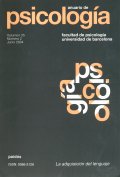Referential communication and social understanding: Are they independent or interconnected?
Keywords:
Social knowledge, theory of mind, referential communication, communicative development, verbal interaction, pragmatic development.Abstract
This study aims to examine the relationship between preschool children's ability to infer the mental states of others (referred to as Theory of Mind) and the type of communicative interactions they develop in referential commumications contexts. Specifically, the present investigation involved74 Spanish-speaking children aged between 3; 4 and 5;9. These children participated in two Theorly of Mind tasks: The Attribution of knowledge-ignorance task (Pillow, 1989; adapted by Welch-Ross, 1997) and the Understanding of False-belief task (Baron Cohen, Leslie & Frith, 1985; Núñez's version, 1993). In addition, the participants were paired
according to age and level of peijformance on the two tasks in order to participate in a referential communication task specifically designed for the present study. Communicative interactions between participants were videorecorded, transcribed and analysed using a coding system involving
three dimensions: pragmatic functions, descriptive adequacy and message ambiguity. Results revealed significant differences in the types of communicative resources used by the children with different levels of Theoiy of Mind. In particular, the False-belief task was found to be strongly correlated with communicative skill. It is proposed that children who have different levels of social understanding with respect to mental life are likely to have different representations of the communicative process and thus
may utilise different strategies to guide social-communicative interactions in referential communication settings.
Downloads
Published
2004-01-12
Issue
Section
Estudios
License
The authors who publish in this journal agree to the following terms:
Authors transfer to the publisher all copyright for the full term of protection and for all the world.
The authors can post a copy of their articles in accordance with the policy of free access to the journal.


